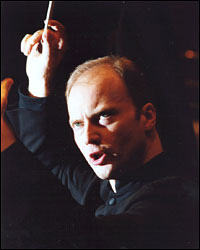

 |
 |
|
| Prokofiev and Shostakovich  Prom 8: Royal Albert Hall. 20 July 2006.
Prokofiev War and Peace - Overture Shostakovich Suite on poems of Michelangelo Buonarroti, Op.145 Prokofiev Romeo & Juliet (excerpts)
A trio of works that each hold at their core a pair of concerns can be an interesting basis for a concert. Some of these pairs are more obvious than others: love and death permeate both Prokofiev scores, to frame the bringing together of a sculptor's and a composer's comments on artistic concerns.
Love and patriotism dominate the overture to Prokofiev's War and Peace, and a fine curtain raiser it makes to a programme. Opportunities for the brass to show resplendent tone early on were taken, as was the legato phrasing of the strings in the mid-sections.
Shostakovich's Suite on poems of Michelangelo Buonarroti dates from 1974, the year before his death and is in all but name his sixteenth symphony. The work more than any other lays bare comments on issues that had long concerned him. Dark and sepulchral in feeling the music moves with economic sparcity throughout the orchestra. Noseda made much out of little, encouraging a chamber-scale reading at times and showed a repeated willingness to revel in the textures afforded by held chords. Where required he also brought powerful playing from the full orchestra – in song 5, Anger, or song 8, Creativity - the impact of which was all the greater for the subdued playing of the preceding material. Ildar Abdrazakov, variously called a baritone and a bass in the programme; in truth he is a baritone with a low reach, made for an imposing soloist in terms of both voice and stature. Varying the tone with each song his delivery matched the individual moods with remarkable clarity to lay emphasis upon nuances of the texts. A romance not normally associated with Shostakovich was apparent in song 3, Love, and an apt reverence in song 6, Dante. The final sequence though effectively made the journey from Shostakovich's present – Night portraying the end of a weary life – to his imminent death and beyond to immortality. Desolation and mocking sourness were all pervasive in Noseda's reading. These forces have recently recorded the cycle for Chandos; on this evidence that would be a disc well worth investigating.
In setting Romeo and Juliet as a ballet Prokofiev was able to give prominence to many of his central compositional concerns: clarity of texture and scoring, but more importantly the exploration of dramatic possibilities through juxtaposing an almost classical conservatism the almost self-destructive. Conducting his own selection of items drawn from the three suites Noseda lived the music fully – at times almost appearing possessed by it. From the start he brought stark elemental qualities from the orchestra with driven tempi dominating proceedings a little. That he also found jazziness, heart on sleeve tenderness and well-rounded characterisation to fill his orchestral stage demonstrated that the reading was not all bombast. The Dance of the Antilles Girls brought a welcome interlude of delicate colour before the final full-on skirmish that is Tybalt's death, leaving the star-crossed lovers to their on fates.
If, as is widely expected, Valery Gergiev intends to turn the LSO into the finest Russian orchestra outside Russia, he stands warned that Noseda and his Manchester forces already provide stiff opposition.
Evan Dickerson
|